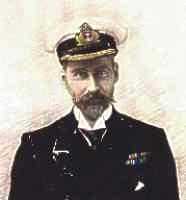Arthur Wellesley Morrell
| Arthur Wellesley Morrell | |
|---|---|
 Paymaster-Captain Arthur Wellesley Morrell, RN | |
| Born |
18 June 1862 Gillingham, Kent, England |
| Died |
1 August 1944 (aged 82) Wimbledon, Surrey, England |
| Allegiance |
|
| Service/branch |
|
| Years of service | 1877–1921 |
| Rank | Paymaster-Captain |
| Awards |
Khedive's Sudan Medal China War Medal |
Paymaster-Captain Arthur Wellesley Morrell RN (18 June 1862 to 1 August 1944) was a Freemason and British naval pay officer who served during the latter part of the Victorian era and through to the end of World War I, and who was also present at the Reconquest of the Sudan, the Relief of China, and the Blockade of Bangkok.
Family
Arthur Wellesley Morrell was born 18 June 1862; the eldest child of Commander George Truman Morrell, RN, and Ellen, and was a fourth-generation Royal Navy officer.
His uncle, who was also named Arthur, rose to become a Rear-Admiral, and his grandfather, another Arthur, retired as a Captain. His great-grandfather, John Morrell, had been a lieutenant in the Royal Navy.
He had many siblings, including Patrick, who would go on to become a vicar in Burton, Chester, and another, William, who would also join the navy. In his diaries, he wrote of occasionally encountering "Willie" while the two were serving at sea. His diaries also note his brother Douglas, who died in 1903, as serving in the navy.[1]
Arthur married quite late in life, marrying Beatrice Macdonnell Smith on 5 December 1911, aged 49. They had no known natural children of their own, but would adopt Douglas Wellesley Morrell in 1917 or 1918. It is thought that the name Douglas was chosen to honour Arthur's brother, who died in 1903.
Masonic involvement
It is thought that Arthur was active in freemasonry. In particular, he is known to have been addressed as "Bro. Arthur Morrell" by the Zetland Lodge, No. 525 EC, a masonic lodge in Hong Kong, and had received correspondence from the Oriental Lodge, No. 687, in Constantinople. In his diaries he wrote of attending Rose Croix ceremonies, and recorded the purchase of masonic accoutrements.[1]
Career
Arthur joined the Royal Navy at age 14 as an assistant clerk on 15 January 1877.[2]
In 1878, he served as a clerk aboard HMS Triumph. In 1893, he was aboard HMS Swift during a blockade of Bangkok. Three years later he found himself aboard HMS Melita during an expedition up the Nile River to Dongola, in Sudan, during the Reconquest of Sudan by an Anglo-Egyptian force. He would be awarded the Khedive's Sudan Medal for this expedition, his known only foreign honour.[3]
In 1900, he found himself a paymaster aboard HMS Aurora, when it was ordered to China to aid in the eight-nation alliance that suppressed the Boxer Rebellion. From his ship he saw first hand the taking of the Taku Forts and wrote in his diaries of the action, detailing the battles and casualties.[3]
After a lengthy period of serving in relative tranquility, Arthur found himself near the end of his career a Fleet Paymaster aboard HMS Leander, then HMS President, and finally HMS Impregnable during World War I, for which he would earn his last three medals.
His career spanned 36 years of service at sea, and saw the end of the golden age of sail and the full transition to the steam-powered, steel ships of war. Although only a paymaster, he was considered a trusted senior officer, judging by comments noted on his service record. In 1894, the captain of HMS Galatea described Arthur as having "done his work in a very efficient manner." Later that year, an Admiral named Freemantle noted that he was "trustworthy and zealous." Captain Simons, of the HMS Melita, called him "a capable paymaster, of good judgement."[3]
He retired on 1 January 1921 and was in receipt of a naval pension, initially £900 per year, and gradually reduced to £814 at the time of his death in 1944.[4]
Ships
Arthur served aboard the following ships during his career in the Royal Navy:[3][4]
- 1878, HMS Duncan, assistant clerk
- 1878, HMS Duke of Wellington, assistant clerk
- 1878–1883, HMS Triumph, clerk
- 1884–1885, HMS Swiftsure, assistant paymaster
- 1886, HMS Triumph, assistant paymaster
- 1888–1890, HMS Orontes, assistant paymaster
- 1890, HMS Hydra, assistant paymaster
- 1890, HMS Orontes, assistant paymaster
- 1890–1894, HMS Swift, assistant paymaster
- 1894, HMS Galatea, assistant paymaster
- 1895, HMS Pembroke, paymaster
- 1895–1896, HMS Melita, paymaster
- 1897–1905, HMS Aurora, paymaster
- 1905–1907, HMS New Zealand, fleet paymaster
- 1907, HMS Vivid, fleet paymaster
- 1907, HMS Victory, fleet paymaster
- 1907–1908, HMS Venerable, fleet paymaster
- 1909–1911, HMS Hannibal, fleet paymaster
- 1911, HMS Vivid, fleet paymaster
- 1911–1913, HMS Ariadne, fleet paymaster
- 1913–1915, HMS Leander, fleet paymaster
- 1915–1916, HMS President, fleet paymaster
- 1916–1918, HMS Impregnable, fleet paymaster
- 1918, HMS President, paymaster-commander
- 1918–1921, HMS President, paymaster-captain
Honours
Arthur attained the following honours and medals during his naval career, which spanned from 1877 until the end of World War I:
- 1896, Khedive's Sudan Medal[3]
- 1901, China Medal[5]
- 1914–1915 Star
- 1918, British War Medal
- 1918, Victory Medal